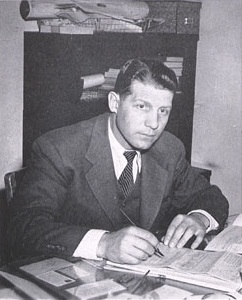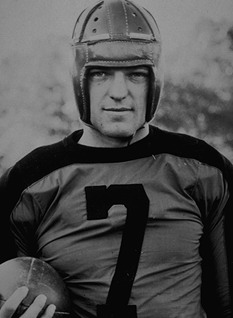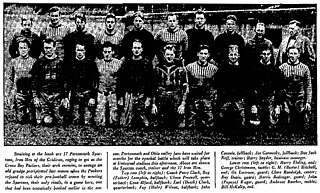
The Frankford Yellow Jackets were a professional American football team, part of the National Football League from 1924 to 1931, although its origin dates back to as early as 1899 with the Frankford Athletic Association. The Yellow Jackets won the NFL championship in 1926. The team played its home games from 1923 in Frankford Stadium in Frankford, a section in the northeastern part of Philadelphia, noted for the Market–Frankford Line that terminates there.

The St. Louis Gunners were an independent professional football team based in St. Louis, Missouri, that played the last three games of the 1934 National Football League season, replacing the Cincinnati Reds on the league schedule after the Reds' league membership was suspended. They won their first game against the Pittsburgh Pirates 6–0, and lost the last two to the Detroit Lions (40–7) and the Green Bay Packers (21–14). Six of the Reds players joined the team for the last two games. The team was headquartered at the St. Louis National Guard Armory, which accounts for its nickname the 'Gunners'.

Glenn Emery "Press" Presnell was an American football player, coach, and college athletics administrator. He set the NFL single-season scoring record in 1933 and led the league in total offense. He was the last surviving member of the Detroit Lions inaugural 1934 team and helped lead the team to its first NFL championship in 1935. He also set an NFL record with a 54-yard field goal in 1934, a record which was not broken for 19 years. Presnell served as the head football coach at the University of Nebraska–Lincoln in 1942 and at Eastern Kentucky State College—now known as Eastern Kentucky University–from 1954 to 1963, compiling a career college football coaching record of 45–56–3. He was also the athletic director at Eastern Kentucky from 1963 to 1971.
The 1930 NFL season was the 11th regular season of the National Football League.
The 1931 NFL season was the 12th regular season of the National Football League. The league decreased to 10 teams due to financial hardships caused by the Great Depression: while the Cleveland Indians joined as an expansion team and the league lost the Minneapolis Red Jackets and the Newark Tornadoes, the Frankford Yellow Jackets folded midway through the season.
The 1932 NFL Playoff Game was an extra game held to break a tie in the 1932 season's final standings in the National Football League (NFL); it matched the host Chicago Bears and the Portsmouth Spartans. Because of snowfall and anticipated extremely cold temperatures in Chicago, Illinois, it was moved indoors and played at the three-year-old Chicago Stadium on December 18 on a reduced-size field on Sunday night.
The 1932 NFL season was the 13th regular season of the National Football League. It was a year marked by a decrease in the number of franchises to just eight and the last time all teams were encompassed in a single division.
The 1934 NFL season was the 15th regular season of the National Football League (NFL). Before the season, the Portsmouth Spartans moved from Ohio to Detroit, Michigan, and were renamed the Detroit Lions.

Earl Harry "Dutch" Clark, sometimes also known as "the Flying Dutchman" and "the Old Master", was an American football player and coach, basketball player and coach, and university athletic director. He gained his greatest acclaim as a football player and was inducted into the College Football Hall of Fame with its inaugural class in 1951 and the Pro Football Hall of Fame with its inaugural class in 1963. He was also named in 1969 to the NFL 1930s All-Decade Team and was the first player to have his jersey retired by the Detroit Lions.

The 1932 season was the Chicago Bears' 13th in the National Football League. The team was able to improve on their 9–4–1 record from 1931 and finished with a 7–1–6 record under third-year head coach Ralph Jones.
The Ironton Tanks were a semi-professional football team organized in 1919 in Ironton, Ohio.

Roy Lee "Father" Lumpkin was an American football player.
The 1932 Green Bay Packers season was their 14th season overall and their 12th in the National Football League. The team finished with a 10–3–1 record under founder and head coach Curly Lambeau, earning them a second-place finish despite winning three more games than the champion Chicago Bears. With only one loss, the Bears' winning percentage was calculated by the league at .875, as ties were discarded, compared to the Packers' .769.

The 1935 Detroit Lions season was the franchise's 6th season in the National Football League (NFL) and second in Detroit. Under fifth-year head coach Potsy Clark, the Lions placed first in the NFL's Western Division and defeated the New York Giants 26–7 in the NFL Championship Game for their first league title.

In 1932, the Portsmouth Spartans appeared in the league championship game, the first playoff game in NFL history, losing to the Chicago Bears 9–0. With a record of 6–1–4 in 1932, the Spartans finished in a tie for the NFL title with the Chicago Bears. It was the first time in history that the season ended with two teams atop the league's standings. Both games during the season between Portsmouth and Chicago had ended in ties; to determine a sole champion, the league office arranged for the first playoff game in NFL history.

The 1934 Detroit Lions season was the fifth in franchise history and the first in Detroit; the franchise had previously played as the Portsmouth Spartans in Portsmouth, Ohio, a city with a population of approximately 40,000. Under head coach Potsy Clark, the Lions won their first ten games then lost three straight in an eight-day span to end the season at 10–3. They finished in second place in the NFL Western Division, three games behind the undefeated Chicago Bears.
The 1933 Portsmouth Spartans season was their fourth in the league and final season before becoming the Detroit Lions. The team failed to improve on their previous season's output of 6–2–4, losing five games. They failed to qualify for the playoffs.

Harry Joseph "Irish" Ebding was a professional American football end. A collegiate All-American for Saint Mary's College in California, Ebding played seven seasons in the National Football League (NFL) for the Portsmouth Spartans (1931–1933) and their successor organization, the Detroit Lions (1934–1937).
The Bears–Lions rivalry is a National Football League (NFL) rivalry between the Chicago Bears and Detroit Lions. The franchises first met in 1930 when the Lions were known as the Portsmouth Spartans and based in Portsmouth, Ohio. They moved to Detroit for the 1934 season. The Bears and Lions have been division rivals since 1933 and have usually met twice a season since the Lions franchise began. The two teams play in the two largest metropolitan areas in the Midwest. Chicago and Detroit's home stadiums, Soldier Field and Ford Field, are 280 miles apart and both are easily accessible from I-94. This rivalry is the longest-running annual series in the NFL as both teams have met at least once a season since 1930.










